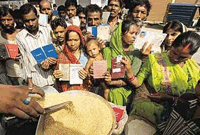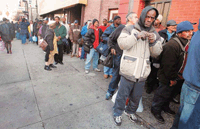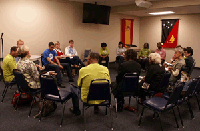Growing up in India taught Phil DeVol, Co-Author of "Bridges out of Poverty" and author of "Getting Ahead in a Just-Gettin'-by-World" several things…
"I've always been really conscious of poverty and the class issue since I was young," DeVol said.
His parents were doctors, running a hospital in India. DeVol didn't move to America until he was 18 years old.
It was in that land of caste systems that he saw things that influenced him later in life. This inspired and brought about his work with Bridges out of Poverty (B.O.P.), which seeks to educate individuals, and eliminate poverty.

Lessons from India
DeVol began using B.O.P. concepts while running an addiction treatment center in the U.S., where most of his clients came from poverty and unstable environments.
"I used my middle class mindset in designing all of the programs for them," DeVol said.
While at the treatment center he got a flashback of India, where he says the middle class run all the organizations and institutions.
"India is a country with huge caste and class structures," DeVol said, "The middle class has so much rank over the people in poverty that we decide what they're going to do," he continued.
"And this reminded me what it was like in India," he said, of his experience of running the treatment center from a middle class mindset.
"When the middle class run these organizations they do the planning for people in poverty. They talk to them, they talk at them, and tell them what to do. But somehow or another those in poverty never make it to the decision-making table."
While in India, DeVol's family found that their mission struggled with how to interact with the Indian Christians.
"They never really talked with the Indian people in the church," DeVol said.
This led DeVol's family to find how to engage people across class lines and get people in poverty to the planning-and decision-making table. And how to get the middle class to listen.

Coming to America
"When I came to the U.S., I was surprised to see that there was poverty here too," DeVol shared, "In India the poverty will kill you, but I thought here if you play the "game" you're going to do ok."
Instead, he says he found out that there are a lot of people in poverty here and that it's very difficult to get out of it.
"It's harder to get out of poverty in the U.S. now, than in Europe," he said.
"Upward mobility has become much harder for people in this country. The middle class is shrinking and many in the working class are slipping into situational poverty. It's become a hard time for low wage workers and people at the bottom of the economic ladder," he continued.
B.O.P. helps people find a way out of poverty, by not only educating individuals on the "hidden rules of society" based on different social classes, but also connecting them to a support group to see the plan through.
B.O.P. ideas and strategies are slowly becoming widespread and used in a variety of sectors now, including courts, businesses and colleges.
Some courts in Ohio have already begun implementing its ideas.
"Judge Carol Robb from Columbiana County has applied these ideas in her court and has really made some remarkable changes," DeVol said.

American and Global Action
DeVol began his mission in Mount Vernon, Ohio, by investigating with a few different groups of people in poverty. He wanted to find the missing link, or barriers between the different classes. This project led to his writing the book "Getting Ahead in a Just Getting by World".
Slowly, his ideas began to spread.
A handful of groups in America have already been successfully applying the B.O.P. principles.
"In the business sector there's a group in Vermont that has done really great stuff with our work," DeVol said.
The group, "Working Bridges", has already won the Society for Human Resource Management (SHRM) Award and Pinnacle Award. They have over 10 different companies that have come together to use B.O.P. ideas.
"They use our ideas with low wage employees to improve their retention rate and have a better climate in their own shops," DeVol said.
Cascade Engineering in Grand Rapids, Michigan has also incorporated the principles at their plastics firm.
"They use our work and have had really remarkable success," DeVol said.
Colleges have begun using their work as well. Devol co-authored a book for low-income, first-generation college students; the goal being to help the students stay on campus quarter to quarter until graduation.
B.O.P. is not only being incorporated in America, but also Canada, Australia and Slovakia.
The book has even been translated into Slovak.

The Idea
"The idea is that 10-12 people at a time use the book "Getting Ahead". They sit around a kitchen table together and work with a facilitator," DeVol said.
The facilitator is not there to tell the people what to do. He or she simply helps facilitate the discussion to stay focused.
The group as a whole investigates the impact that poverty has had on them and their community, and then analyzes their own personal situation, followed by the community situation.
Then they create a plan.
"What this does is gives people who are in poverty the same language as the middle class after they read the Bridges book or come to a workshop. So now you have people in a community that have the same words, language and concepts for understanding poverty," DeVol said.
This common language is what allows them to understand each other and begin to solve problems.
"You have wealthy people, middle class people, and people in poverty all working towards the same end, trying to make communities where everyone can live well," DeVol said.
DeVol makes it clear that B.O.P. is not a program, but a set of ideas to be used.
"If people are attracted to this work and these ideas then they can start using them. That's where these champions have come from; these people who have done great things. They take our ideas and go," DeVol said.
"People in Akron have been thinking about this for a long time, now they are really getting started. I think they will do a very good job," DeVol said.
For more information on local B.O.P. training and groups please contact Open M at 330.434.0110. You can also visit www.gettingaheadnetwork.com for more info. on the Getting Ahead Network.
To read Part One of the story click the link.
If you have any story ideas, questions, or comments you can contact me at Katie@akroneur.com.